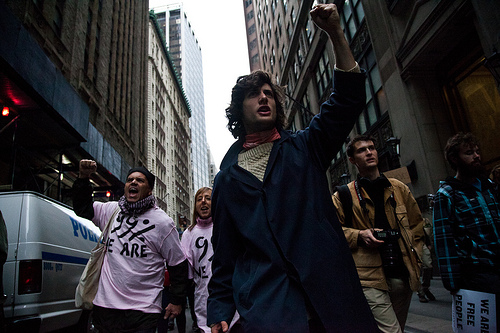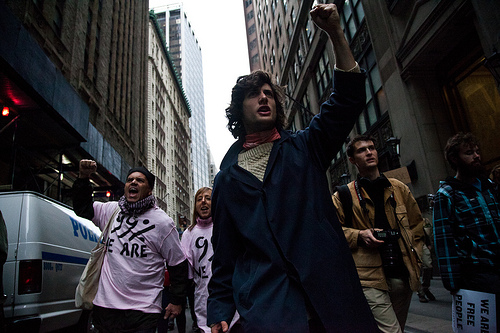 Photo: Lauren DeCicca via weeklydig“Mike check!
Photo: Lauren DeCicca via weeklydig“Mike check!
“MIKE CHECK!”
“Mike check!”
“MIKE CHECK!”
This call-and-response has become a familiar refrain for those who have attended Occupy Wall Street protests or followed the movement from afar. When police banned sound systems in many encampments, protesters responded by creating human amplifiers: Anyone who has something to say to the crowd cues up the mike, and people standing nearby chant the speaker’s message in unison. The routine is a hallmark of the movement’s spirit of plucky, hacker-style innovation and its egalitarian, anyone-gets-a-chance-to-speak ethos.
It also gets incredibly tiresome. Once you’ve heard enough self-important babble parroted this way, you begin to cringe each time the fateful words are uttered: “Mike check!” Tuesday night, as the NYPD forced protesters out of Zuccotti Park and hauled off their tents and belongings, one man used a human microphone for a little personal counseling session:
“For the first time.”
“FOR THE FIRST TIME!”
“I felt like my life had meaning.”
“I FELT LIKE MY LIFE HAD MEANING!”
Oh, dear god, turn that thing off!
Tricks like the “mike check,” the general assembly meetings, and the leaderless, “horizontal” structure of the movement (a structure that the protesters adopted after seizing control from a more traditional “vertical” organizing group that tried to control an early gathering) tipped people off to the fresh, creative spirit that lay beneath the protests — and the fact that the occupy encampments are a part of a larger phenomenon tied up in urban youth culture. Sarah Goodyear captured it in a post for Grist:
Fed up with a broken system that delivers little of what it promises, they are using urban public space as an open-source laboratory for social change … Failure is expected and seen as a creative force, rather than as something to be feared. Input from others is welcome … In a significant departure from the attitude of previous generations of entrepreneurs and activists, there’s not a lot of proprietary grasping going on. It’s a creative commons approach to the physical commons.
But as nifty as all this was, the movement struggled to get beyond the bounds of the parks, to inspire broader action. A crowd of several thousand marched on the port in Oakland to show its support. But back in New York in the first weeks of November, as protesters hunkered down for the winter and sickness spread through the camps, it looked like OWS would be remembered as little more than a grimy, if inspired, campout in the park.
Then, on Tuesday night, the good mayor of New York City did the movement a huge favor. By evicting the protesters, Michael Bloomberg forced them to consider their next move.
The cleanup was done in the dark of night: As the viewers on one web stream counter spun past 20,000, protesters chanted “The world is watching!” One commenter on Twitter quipped, “The world is sleeping.” But by morning, the raid had turned the world’s attention back to a movement that itself had been slumbering, albeit in a public park.
As Glenn Greenwald wrote on Salon:
Nothing highlights the validity of the movement’s core grievances more than watching a piggish billionaire Wall Street Mayor — who bought and clung to his political power using his personal fortune — deploy force against marginalized citizens peacefully and lawfully protesting joblessness, foreclosures and economic suffering. If Michael Bloomberg didn’t exist, the Occupy protesters would have to invent him.
Last night, protesters marched across the Brooklyn Bridge — a feat that they’d attempted but failed at weeks earlier. A police scanner reportedly put the crowd surging through the streets of Manhattan at 32,000 people. Thousands more marched in solidarity across the country.
But while yesterday’s protests were a clear sign that the OWS movement reaches beyond a handful of hardy malcontents, the question still remains: What next?
Hendrik Hertzberg, political commentator at The New Yorker, is one of the many who have suggested that OWS take a lesson from the Tea Party and get political:
After Obama sailed into office on the biggest popular-vote majority in twenty years, Republicans were left treading water. A few months later, the Tea Party came along to pick them up, dry them off, give them a new suit of clothes, and set them on a starboard course to victory in the 2010 midterms. The rescue wasn’t free of charge, of course. The cost, to the country as well as to the sad remnants of moderate Republicanism, has been high. But there’s no denying the potency of whatever it was that the brave new party injected into the scarred veins of the grand old one.
The Democrats could use a similar leg up about now, but for all their populist similarities, the Tea Party and Occupy Wall Street are different creatures entirely. As my friend and science fiction writer Paolo Bacigalupi pointed out via Twitter yesterday, “The teaparty is also defined by obstructionism. Bringing congress to deadlock is easy. Progressive reforms are the opposite.”
Progressive reform? Any hope we had for progressive reform was tied up in Barack Obama — a man who has proven unwilling or incapable of breaking through the current political and environmental gridlock. David Graeber, a longtime activist who is widely credited for inventing the “We are the 99%” slogan, has written a fascinating treatise on OWS. In it, he points to widespread discontent with Obama as the reason that Occupy Wall Street is unlikely to embrace electoral politics.
And perhaps that’s okay. It may be that the Occupy movement does its best work on the fringe, where it can expand the national dialogue and stretch the edges of the “Overton window” — the range of positions that’s considered acceptable to talk about in the media and public dialogue. Here’s Obama Amabo writing in the Daily Kos:
Those who persevered for years in protesting the Vietnam War did not fail, despite the glacial progress. Every sit-in, every rally, every march on Washington slowly shifted the thinking of the American public until finally the war became sufficiently unpopular that even the spineless politicians in Congress were willing to cut off the funding. By 1976, the country was sick of American imperialism, and elected Jimmy Carter.
In the nearer term, Occupy Wall Street and the broader youth movement of which it is a part have already shown their knack for transformation on a more micro/local level. Could the protests of the past two months sow the seeds of a many-pronged, grassroots movement that makes changes neighborhood by neighborhood, city by city?
The answer here is maybe: Without real engagement in the political system, the impact will be limited, even at the local level.
To illustrate this point, I’ll offer a story from Baltimore, where I lived until a few months ago. This year, I watched a young, MIT-educated planner named Otis Rolley, backed by a phalanx of young creatives, techies, and entrepreneurs, take on the establishment’s candidate for mayor. Despite an inspired and vigorous campaign, Rolley got trounced.
Even more telling, though, was the story of DeVon Brown, a 21-year-old Baltimore native who, as a teenager, was among a group of boys who were sent to school in Africa to free them from the ills of the inner city. (Their story was immortalized in the documentary film The Boys of Baraka.) He returned to Baltimore determined to tackle the poverty and injustice that held down young people like himself — and this year, he ran for city council in a district that included the main campus of Johns Hopkins University. If ever there was a candidate that young reformers could believe in, Brown was it.
My friend Joe Giordano wrote a piece about Brown in Gutter magazine following the election:
Brown came to our front door loaded with goals and dreams of reforming the city from within and kicking out the old regime. We loved him, to say the least, and took a sign for our window. On election day, we dutifully turned out and pressed “BROWN” on the screen.
He lost. In the worst election turnout in the city’s history.
Now we come to the Occupy Baltimore protest, who, based on Twitter feeds and FB updates, hope to change the city’s policies by sitting in a small triangle at the tourist (and media) friendly Inner Harbor …
Where were all these people on the city’s voting day when virtually no one showed up?
If the young people who are breathing new life into cities like Baltimore and give the Occupy movement its fire can transform their power from street capital into political capital, reform candidates like Rolley and Brown might stand a chance. But apathy and disengagement will drag them down.
The Occupy Wall Street movement will no doubt evolve and spin off in ways that I, at least, cannot imagine. This new generation of innovative, culture-jamming activists has shown its ability to make a ruckus, to transform city streets and spaces into incubators of free expression. Its lasting effects, however, will depend to some degree on whether protesters are willing to bring their ideas out of the shadows and into the larger public sphere.
“Mike check!”
“MIKE CHECK!”
“Mike check!”
“MIKE CHECK!”
OK, we’ve got the world’s attention. What’s our next move?



